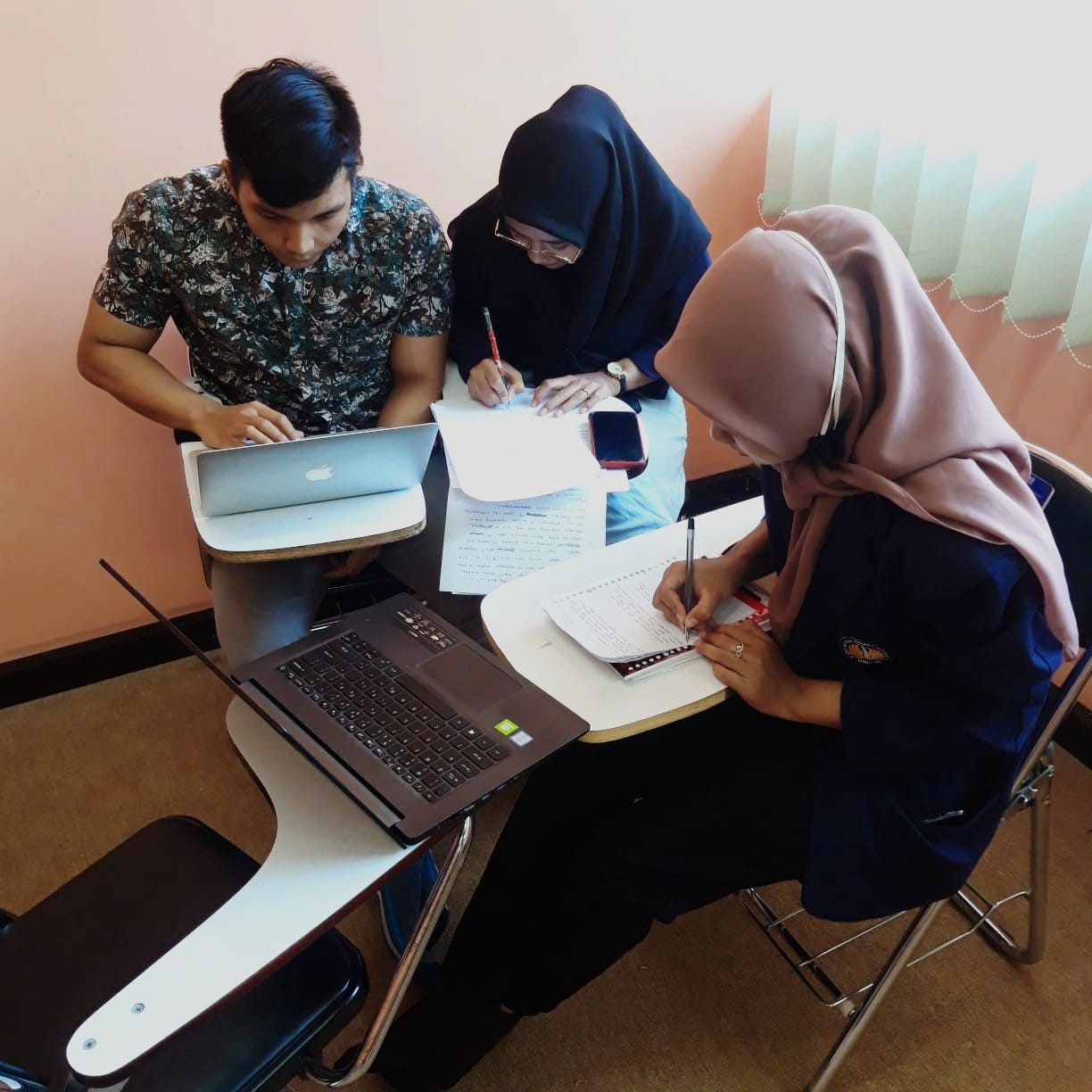Investigation of university students’ critical thinking in debate: Justification for the “AREL” argumentation process
DOI:
https://doi.org/10.21070/jees.v8i2.1766Keywords:
AREL, argumentation process, argument trait, critical thinking, debateAbstract
This qualitative research investigated students’ critical thinking in a debate group at a university level. It involved six students who performed a debate that used the Asian Parliamentary System. Data on students’ critical thinking were collected by using field notes and video recording. Content analysis was employed to analyze the data focusing on the use of argument traits of the AREL model. The traits consist of Assertian, Reasoning, Evidence, and Link Back (AREL). Moreover, a self-evaluation questionnaire was distributed to triangulate the students’ critical thinking levels. It was found that students’ critical thinking level was mostly below average. Four out of six students did not meet the score which is the threshold level of a high-level debater. Most of their argument traits consist of Assertion (A), Reasoning (R), and Evidence (E), leaving Link back (L) traits untouched. Interestingly, this research revealed a new finding. Many of the students used a multi-layer structure of argumentation. In practice, they occasionally used Assertions with more than one Reasoning and more than one Evidence.
HIGHLIGHTS:
- The components of argument (argument traits) consist of Assertion, Reasoning, Evidence, and Link Back (AREL) and are used to see the argumentation process of debaters.
- The major argumentation process of debaters was incomplete and inconsistent since they only fulfilled Assertion, Reasoning, and Evidence (ARE). However, some might provide multi-layer argument traits as they could make more than one Reasoning and Evidence under one Assertion.
- The students’ or debaters’ critical thinking can be measured by the quality of their argumentation process and assessed using a questionnaire provided by Cottrell (2005).
Downloads
References
Bezanilla, M., Nogueira, D., Poblete, M., & Domínguez, H. (2019). Methodologies for teaching-learning critical thinking in higher education: The teacher’s view. Thinking Skills and Creativity. doi:10.1016/j.tsc.2019.100584
Brown, M., Beeber, J., & Boylan, D. (2021). IMPROVING CRITICAL THINKING SKILLS: AUGMENTED FEEDBACK AND POST-EXAM DEBATE: A FOLLOW-UP STUDY. Business Education & Accreditation, 13(1), 1-10.
Chen, Y. (2021). Language and Critical Thinking Integrated Teaching Reform on English Public Speaking Course in the Context of “New Liberal Arts”. Open Access Library Journal. doi:10.4236/oalib.1107535
Cottrell, S. (2005). Critical Thinking Skills: Developing Effective Analysis and Argument. New York: PALGRAVE MACMILLAN.
Fisher, A. (2001). Critical Thinking: An Introduction . Cambridge: Cambridge University Press.
JDF. (2014). Handbook for Competitive Debating: Asian Parliamentary Format. Yogyakarta.
Johnson, S. (1968). Winning debates: a guide to debating in the style of the world universities debating championships. New York: International Debate Education Association.
Meany, J., & Shuster, K. (2003). On That Point! New York: nternational Debate Education Association.
Muhammadiyeva, H., Mahkamova, D., Valiyeva, D., & Tojiboyev, I. (2020). The Role of Critical Thinking in Developing Speaking Skills. International Journal on Integrated Education, 3(1), 62-64. doi:10.31149/ijie.v3i1.41.
Nangimah, M. (2020). DEVELOPING ENGINEERING STUDENTS CRITICAL THINKING FOR PUBLIC SPEAKING THROUGH PROBLEM-BASED LEARNING. LLT Journal: A Journal on Language and Language Teaching, 23(1), 80-88. doi:10.24071/llt.v23i1.2472
Narmaditya, B., & Omar , I. (2019). Debate-Based Learning and Its Impacton Students’Critical Thinking Skills. Classroom Action Research Journal, 3(1), 1-7. doi:10.17977/um013v3i12010p001
Nirwana, S., & Kurniawati, N. (2018). AREL to enhance student's speaking skills in debating. Journal of English Pedagogy, Linguistics, Literature, and Teaching, 6(2), 1-16. doi:10.35194/jj.v6i2.413
Pravita, A. R., & Kuswandono, P. (2021). Critical thinking implementation in an English education course: Why is it so challenging? EduLite: Journal of English Education, Literature and Culture, 6(2), 300-313. doi:10.30659/e.6.2.300-313
Quinn, S. (2005). Debating. Birsbane, Queensland.
Rahmawati, A., & Syafiq, A. (2017). Improving speaking skill through british parliamentary debate by using AREL for nursing. University Research Colloqium, 6, pp. 315-322.
Saleh, S. E. (2019). CRITICAL THINKING AS A 21st CENTURY SKILL: CONCEPTIONS, IMPLEMENTATION AND CHALLENGES IN THE EFL CLASSROOM. European Journal of Foreign Language Teaching, 4(1). doi: 10.5281/zenodo.254283
Tao, Y., & Griffith, E. (2020). Making Critical Thinking Skills Training Explicit, Engaging, and Effective through Live Debates on Current Political Issues: A Pilot Pedagogical Experiment. PS: Political Science & Politics, 53(1), 155-160. doi:10.1017/S104909651900115X
Tiasadi, K. (2020). DEBATING PRACTICE TO SUPPORT CRITICAL THINKING SKILLS: DEBATERS’ PERCEPTION. AKSARA: Jurnal Bahasa dan Sastra, 21(1), 1-16. doi:10.23960/aksara/v21i1.pp1-16
Wahyuni, S., Qamariah, H., Gani, S., Yusuf, Y., & Syahputra, M. (2019). Critical Thinking Skills: British Parliamentary Debate System to Improve English as Foreign Language (EFL) Students’ Critical Speaking. Budapest International Research and Critics Institute-Journal, 2(3), 429-433. doi:10.33258/birci.v2i3.444
Walker, A., & Kettler, T. (2020). Developing Critical Thinking Skills in High Ability Adolescents: Effects of a Debate and Argument Analysis Curriculum. Talent, 10(1), 21-39. doi:10.46893/talent.758473
Zhou, P., Zhang, Y., & Yang, Q. (2018). The Influence of Debating Teaching on Students' Critical Thinking Development in Smart Classroom. Seventh International Conference of Educational Innovation through Technology (EITT), (pp. 47-52). Auckland. doi:10.1109/EITT.2018.00018.

Published
How to Cite
Issue
Section
License
Copyright (c) 2023 Landry Dwiyoga Daniswara, Bambang Yudi Cahyono

This work is licensed under a Creative Commons Attribution 4.0 International License.







